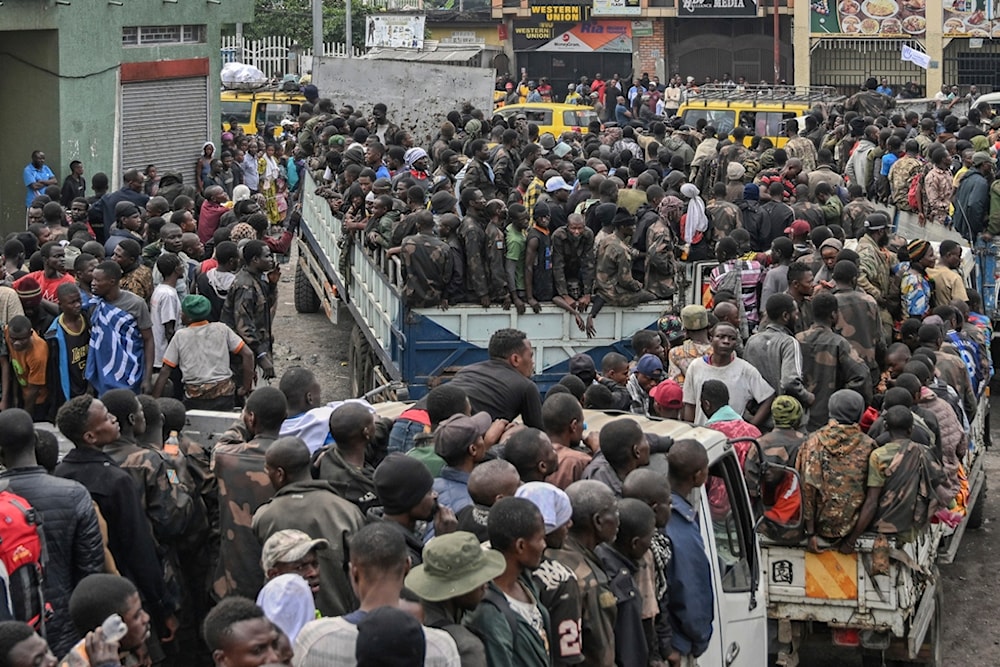M23 militants, Rawdan soldiers enter DR Congo's Bukavu
M23 fighters, backed by Rwandan troops, entered Bukavu, the capital of DR Congo’s South Kivu province, facing little resistance after seizing the main airport.
-

M23 rebels escort government soldiers and police who surrendered to an undisclosed location in Goma, Democratic republic of the Congo, Thursday, Jan. 30, 2025 (AP)
M23 fighters, alongside Rwandan troops, entered Bukavu, the capital of DR Congo’s South Kivu province, on Friday, facing little to no resistance after seizing the region’s main airport, according to security and humanitarian sources.
Congolese President Felix Tshisekedi condemned Rwanda’s “expansionist ambitions” in the mineral-rich region, accusing Kigali of backing the anti-government armed group.
A government source told AFP that Tshisekedi would not attend the upcoming African Union summit in Ethiopia, opting to closely monitor the unfolding crisis.
As M23 and Rwandan troops approached Bukavu’s outskirts, businesses shuttered, and frightened civilians fled, prompting African leaders to call for an immediate ceasefire.
Civil groups issued an urgent plea to Congolese forces, urging them to avoid fighting within the city to prevent further bloodshed.
Capture of Bukavu pivotal
The capture of Bukavu gives M23 strategic control over much of the Lake Kivu area, which borders Rwanda. The last time the city fell to mutinous soldiers was in 2004.
The latest escalation has raised fears of a broader regional conflict, with several of DR Congo’s nine neighbors and South Africa already having military forces in the country.
According to UN estimates, nearly 3,000 people have been killed in recent fighting. In Goma, which M23 captured last month, parts of the city remain without water, forcing residents to fetch supplies from Lake Kivu, where bodies from recent clashes have been discovered.
The UN Office for the Coordination of Humanitarian Affairs (OCHA) has warned of a cholera outbreak, while the UNHCR reported that targeted attacks on infrastructure and restricted access to displaced communities are hampering relief efforts.
Hundreds of thousands of people have been forced into overcrowded, unsanitary camps on the outskirts of Goma, where dozens of mpox patients are being treated in isolation units, according to the World Health Organization.
Aid projects to be halted
Despite its vast resources, Congo remains heavily reliant on foreign aid, with 70% of humanitarian operations funded by the US last year. However, the situation has been worsened by a pause in US foreign aid imposed by President Donald Trump last month.
Bruno Lemarquis, the top UN aid official in Congo, explained that many partners have been forced to pause their projects. "Finding alternatives will be extremely challenging," he stated.
The situation has further complicated efforts to deliver aid due to the closure of Goma’s airport, making it harder to evacuate injured individuals and bring in supplies. Lemarquis added, "Now that the situation has stabilized and security in the city has improved, we need to bring back staff, which isn’t something that can happen overnight."
The M23's ongoing offensive is the latest chapter in a long history of Tutsi-led insurgency in Congo’s east, following a series of conflicts between 1996 and 2003 that involved neighboring countries and led to millions of deaths.
Rwanda has been accused by Congo, the UN, and several Western nations of backing the M23 militants with troops and weapons, but it denies the allegations, asserting it is acting in "self-defense". A ceasefire declared by the militants in early February for humanitarian purposes quickly collapsed.
The Congolese government reported that its troops had been attacked multiple times since a joint summit last week between Eastern and Southern African blocs aimed at resolving the crisis.

 4 Min Read
4 Min Read










